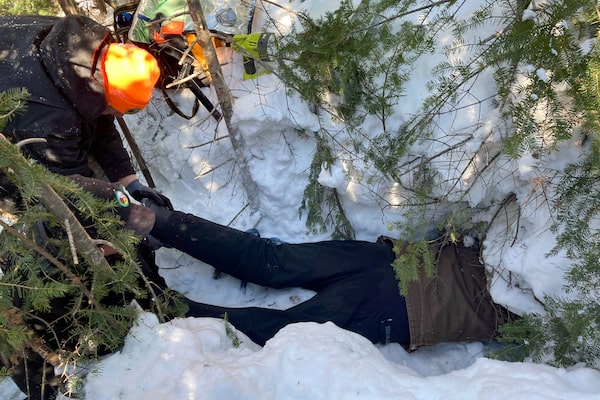Good evening, here are the COVID-19 updates you need to know tonight.
Top headlines:
- Long COVID is affecting thousands of Canadians. These researchers are racing to understand its risk factors, treatments
- As preentry COVID-19 tests disappear, travel is getting easier. Travel insurance is not
- First year of COVID-19 pandemic saw fewer Alberta stroke patients, more deaths: study
In the past seven days, there were 217 deaths announced, down 25 per cent over the same period. At least 3,718 people are being treated in hospitals. Canada’s inoculation rate is 15th among countries with a population of one million or more people.
Sources: Canada data is compiled from government websites, Johns Hopkins and COVID-19 Canada Open Data Working Group; international data is from Johns Hopkins University.
Coronavirus explainers: Coronavirus in maps and charts • Tracking vaccine doses • Lockdown rules and reopening
Photo of the day

Todd Kautz, a post-doctoral researcher from the State University of New York, lies on his belly as a colleague holds his feet. The pair were taking biological samples from a hibernating bear in its den to test for the coronavirus in Grand Portage, Minn. on March 2, 2022.Laura Ungar/The Associated Press
Coronavirus in Canada
- In Ontario, 655 people are in the hospital, 158 in ICU, an increase over 553 hospitalizations and 157 people in ICU on Sunday. More than 10 per cent of hospitals do not report hospitalization data on weekends, so the real number is likely higher.
- There 1,115 people in the hospital with COVID-19 in Quebec, and 53 people in intensive care. On Tuesday, Quebecers over the age of 80, those who live in high-risk settings, and immunocompromised people will become eligible for a fourth vaccine dose.
- Researchers in Alberta found fewer stroke patients, but a higher number of stroke-related deaths, in the first year of the pandemic, which they believe could have occurred because people were avoiding hospitals.
Canadian researchers are racing to understand long COVID, which occurs when people experience long-lasting symptoms from the virus, and is a condition affecting thousands of people.
- Earlier this month, a peer-reviewed study published in the journal Nature found that people who had been infected with the virus experienced a reduction in grey matter and a greater cognitive decline compared with people who had not contracted COVID-19.
Unmasking: Almost every province in the country has removed its mask mandate for public schools. What do the students think of that?
Coronavirus around the world
- Pfizer’s oral COVID-19 therapy will be evaluated as a potential treatment for patients hospitalized with the illness in a major U.K. trial.
- China began its most extensive coronavirus lockdown in two years Monday in Shanghai to conduct mass testing and control a growing outbreak. Residents are required to stay home and deliveries will be left at checkpoints to ensure there is no contact with the outside world.
- Hong Kong is shortening the ban on airlines that are found to have carried three or more passengers who test positive for COVID-19 upon arrival, as the number of local cases continues to ease from its peak.
Coronavirus and business
Ottawa’s decision to lift its pre-entry COVID-19 testing removes yet another obstacle to Canadians’ trips abroad, but navigating the nuances of pandemic-era travel insurance will continue to be anything but easy.
- When buying travel insurance, one of the top issues travellers should get clarity on is how their coverage would be affected if Canada or their destination country were to once again reimpose a Level 3 advisory against non-essential international travel in response to another wave of COVID-19, said Tanisha Kishan, a chartered insurance professional at rates comparison site Ratesdotca.
Also today: Air Canada’s top executive Michael Rosseau sounded an optimistic note about the coming months in a speech to shareholders today, saying that the airline plans to operate at 90 per cent of its prepandemic capacity this summer, restoring routes cut during the pandemic and flying to 33 international destinations.
And: My pandemic investment plunged 80 per cent. Here’s what I learned
Information centre
- Everything you need to know about Canada’s travel restrictions for vaccinated and unvaccinated people
- Where do I book a COVID-19 booster or a vaccine appointment for my kids? Latest rules by province
- Most regions in Canada have lifted their public mask mandates. Where is the rule still in effect?
- Got a vaccine 'hangover'? Here's why
Sources: Canada data are compiled from government websites, Johns Hopkins University and COVID-19 Canada Open Data Working Group; international data are from Johns Hopkins.
What are we missing? Email us: audience@globeandmail.com. Do you know someone who needs this newsletter? Send them to our Newsletters page.